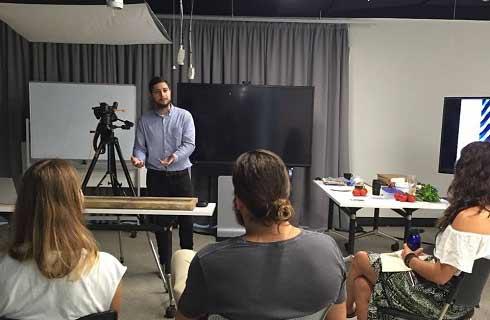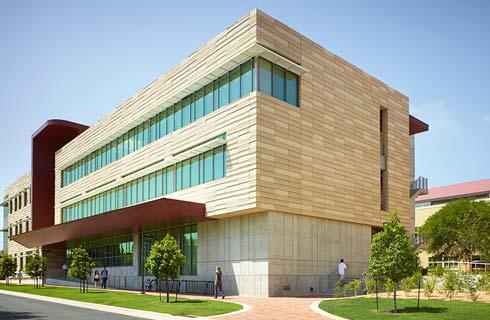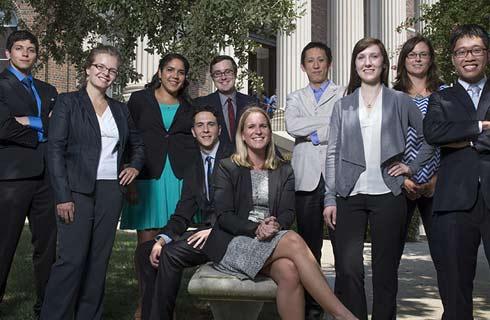建筑工程哲学博士
Doctor of Philosophy in Architectural Engineering

学历文凭
Ph.D.

专业院系
College of Engineering

开学时间

课程时长

课程学费

国际学生入学条件
Students with a 3.00 junior/senior grade-point average (on a 4.00 scale) and with appropriate course backgrounds will be considered for admission to the AE graduate programs. Students accepted into the Architectural Engineering program generally have an undergraduate degree in: mechanical engineering; electrical engineering; civil engineering; architectural engineering; science or architecture.
English Proficiency: TOEFL Internet-based test (iBT) - a total score of 80 with a 19 on the speaking section for the internet-based test (iBT); TOEFL Paper-based test - the minimum acceptable score is 550; IELTS - The minimum acceptable composite score for the IELTS Academic Test is 6.5.
IDP—雅思考试联合主办方

雅思考试总分
6.5
- 雅思总分:6.5
- 托福网考总分:80
- 托福笔试总分:550
- 其他语言考试:NA
CRICOS代码:
申请截止日期: 请与IDP联系 以获取详细信息。
课程简介
The doctor of philosophy (Ph.D.) in architectural engineering focuses on the development of critical thinking skills based on extensive coursework and a thesis that displays a student’s ability to conduct high-quality, original scholarly research. Students gain valuable in-depth knowledge and experience in the building industry and in fields related to their coursework. The student’s program of courses is developed in cooperation with the student’s Ph.D. committee. It is recommended that the course plan contain approximately 30 credits of courses beyond a master’s degree, although there is no established minimum or maximum. Ph.D. graduates are prepared for positions in academia, at research laboratories, or within companies or associations in the building design and construction industries.<br>The goal of the Ph.D. program is to produce outstanding engineers who have demonstrated their abilities through the following: <br> Independent Research: Each Ph.D. candidate must demonstrate an ability to plan and carry out independent and original research. This work must show a high degree of maturity and creativity and contribute to the knowledge base in Architectural Engineering. <br>Depth of Study: Each Ph.D. candidate must develop a depth of understanding in one of the four basic areas of the department: Building Construction, Building Illumination Systems, Building Mechanical and Energy Systems, Building Structural Systems. <br>This is normally established through work on the M.S. degree and will be developed further within the Ph.D. <br>In the area of research, a student is expected to attain a level of understanding far above that normally acquired through typical coursework. This depth is developed not only through an organized series of courses but through extensive independent study and research. <br>Breadth of Study: At all times, the concept of the Architectural Engineer as an individual who possesses a breadth of understanding of the building and building processes must be maintained. Some of this breadth will come from formal classes while the remainder of it will come from self-study, active participation in a wide range of department lectures and activities, a personal interest in buildings, and interaction with fellow students.
相关申请
 预科
预科 奖学金
奖学金 实习机会
实习机会 在校学习
在校学习 跨境学习
跨境学习 校园授课-线上开始
校园授课-线上开始 在线/远程学习
在线/远程学习
开学时间&学费
学费信息仅供参考,请与IDP联系以获取详细信息
| 开学时间 | 时长 | 学费 | 地点 |
|---|
学校排名

世界排名78
数据源:
泰晤士高等教育世界大学排名
关于宾州州立大学帕克分校

每122位本科毕业的美国人中就有1个是PSU的校友1855年建校的宾州州立大学目前已经有了24个校区,University Park是其中的旗舰校区,也是规模最大的校区,容纳学生45000余人。距离宾州州府Harrisburg仅仅17英里的地理位置优势让University Park成为最受欢迎的PSU校区,同时也成为了录取率最低的校区。Party School的称号在PSU身上由来已久,但同时,每年专程跑到PSU校内面试应届毕业生的公司和政府部门超过1000个,这里的学术水准绝对不是盖的。美国每50个工程师中,就有1人是PSU的毕业生PSU的理工课尤其是工程学专业非常知名。实际上从1988年开始,PSU从工业界拿到的学术研究资金总额一直排名美国所有大学的前两位,仅次于麻省理工。很多工业界企业干脆直接将产品研发放在PSU进行。另外,地球与矿产科学学院在美国同类学院中排名第6,其中的地理专业全美第一,地质专业全美第三,均属世界一流学科项目。理论性大众传媒专业同样排名全美第一,与哥伦比亚大学的应用型大众传媒并驾齐驱。 Penn State-University Park的申请竞争相当激烈。申请材料中主观性的PS与简历部分属于非要求项。实际上,每年,单纯从成绩角度做出的录取决定占总录取人数的2/3。所以,想去PSU,得先保证有一个靠谱的标准化成绩。
本校相关课程
其他相关课程

建筑与工程技术文凭
 汤姆逊大学
汤姆逊大学学历文凭
Foundation for Undergraduate
开学日期
课程费用总额


建筑科学学士
 不列颠哥伦比亚理工学院
不列颠哥伦比亚理工学院学历文凭
Bachelor Degree
开学日期
课程费用总额


工程学理学学士-建筑学
 塔夫茨大学
塔夫茨大学泰晤士高等教育世界大学排名:189
学历文凭
Bachelor Degree
开学日期
课程费用总额


建筑工程学士-建设项目管理
 俄克拉荷马州立大学
俄克拉荷马州立大学学历文凭
Bachelor Degree
开学日期
课程费用总额


考古资源管理理学硕士
 堪萨斯州立大学
堪萨斯州立大学泰晤士高等教育世界大学排名:668
学历文凭
Masters Degree
开学日期
课程费用总额


理学学士/建筑工程理学硕士
 堪萨斯州立大学
堪萨斯州立大学泰晤士高等教育世界大学排名:668
学历文凭
Combined Baccalaureate and Master's Prog
开学日期
课程费用总额
















